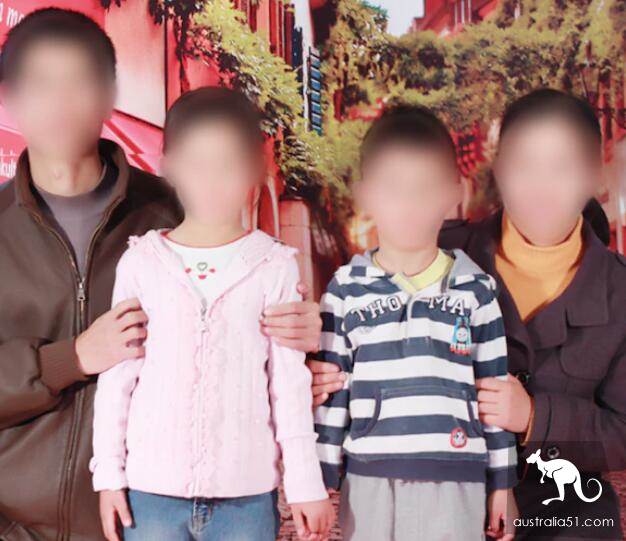
Paul and his family took a picture. (SBS pictures)
Paul, a seven-year-old Chinese man in Sydney, has been told not to meet the health requirements set by the visa when applying for a permanent status in Australia, according to the SBS. The "It`s only $1 a day" of his hepatitis B drug, though.
In order to keep himself and his family in Australia, the father from China had to make a final fight: to stop using hepatitis B drugs.
Paul, who came to Australia with his wife and young children on a student visa in 2012, has been living in Sydney ever since. His children have completed most of their education in Australia, and English has become their main language.
Paul later turned on the teacher`s career and applied for a 186-class employer, guarantee, to keep him and his family in Australia.
Last year, however, he found that the government`s immigration health requirements were not met because he had hepatitis B, and government thought its medical expenses would cost taxpayer too much.
It is reported that hepatitis B is hereditary and may have been infected with the virus from the mother at the time of Paul`s birth. At the same time, Paul told SBS: "I am very depressed about the results. I pay less than A $1 a day for drugs."
"what worries me most is my children. I`ve been here for seven years, and they`re educated here. I know it`s hard for me to bring them back to China."
Under the government`s immigration health requirements, Australian permanent residence applicants are not allowed to have diseases or conditions that "may require health or community services", which may "result in high spending on Australian society". At present, the "high spending threshold" is set at A $40,000.
"assuming that someone in Australia is in the same condition as the applicant and is as serious as the applicant, the person is likely to need long-term professional medical services, including, but not limited to, antiviral drugs," federal health officials said in Paul`s refusal to sign.
Professor Coy (Benjamin Cowie), an expert and type B physician at the University of Melbourne, said the cost of antiviral drugs had fallen sharply in recent years. Paul used to buy medicine from China, but Coy says the price of drugs in Australia is about the same. "if you buy drugs with a private prescription, without government subsidies, the monthly cost is as low as A $30. But under the drug welfare program (PBS), government pays five times the price for the same drug."
If it`s about $30 a month to buy an anti-hepatitis B virus at its own expense, even if Paul lives for 50 years, the total cost of the drug is only $18,000.
I`d like to recount how the PBS program will pay for these drugs and buy only one-fifth of the money at its own expense. "I question whether the drug cost difference is taken into account in the cost plan for Paul`s visa application. The Ministry of the Interior says it is using the drug price paid by the government.
"there`s only one way left."
After being told he had not met the health requirements of immigrants, Paul told doctors in February that he would stop using antiviral drugs he had been taking since 2006. In his view, it was the cost of the medicine that prevented it from meeting its health requirements.
At present, Paul is waiting for the results of the medical examination, and it is hoped that the function of the liver is normal without taking the medicine, with a view to the health-functional reversal of their original decision. "There`s only one way left. If the liver function is good after drug withdrawal and the viral load is low, they may also take into account my application."
But the anti-viral agent, however, said it could reduce the risk of hepatitis B to liver cancer by 50-70 percent in just a few years, "The drug withdrawal is quite dangerous".
At the same time, when Paul stopped, his specialist said he had a good body, "No body symptoms of chronic liver disease".
In Australia, about 230,000 people are reported to have hepatitis B, and the number of people in the country is more than that of hepatitis C and people living with HIV. Hepatitis B can be transmitted through blood and sexually transmitted, but is not transmitted through contaminated food and water, occasional contact, sneezing, and coughing.
Professor Coy said that only in the last five years have hepatitis B patients been refused visas because of their illness. Previously, some people through physical examination to detect hepatitis B infection or take the initiative to report their own illness, but this will not affect their permanent status. "but in recent years, especially in these two or three years, more and more people have been denied the right of permanent residence."

